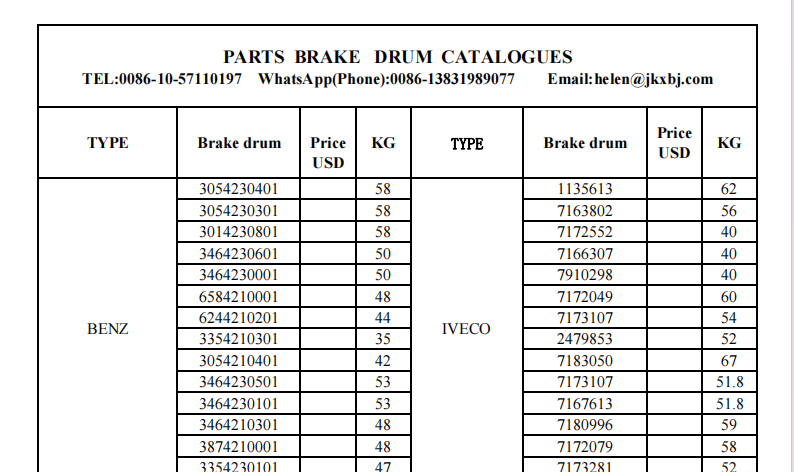ታኅሣ . 10, 2024 10:16 Back to list
brake drum rust
Understanding Brake Drum Rust Causes, Effects, and Prevention
Rust is a common issue that affects various components of vehicles, and brake drums are no exception. Understanding the causes, effects, and prevention methods of brake drum rust is crucial for maintaining vehicle safety and performance. In this article, we will delve into these aspects, providing you with a comprehensive overview of why brake drum rust occurs and how to mitigate its effects.
What are Brake Drums?
Before discussing rust, it's important to understand what brake drums are. Brake drums are part of the drum brake system, which is commonly found in older vehicles and some modern ones. They work in conjunction with brake shoes to stop the vehicle by creating friction. When the brake pedal is pressed, the shoes expand against the inner surface of the brake drum, slowing the wheel's rotation.
Causes of Brake Drum Rust
1. Moisture Exposure One of the primary causes of rust on brake drums is exposure to moisture. When a vehicle is driven, moisture from rain, road salt, or even dew can accumulate on the brake components. If the moisture remains for an extended period, it can lead to oxidation of the metal, causing rust to form.
2. Lack of Use Vehicles that are not driven regularly are more susceptible to rust. When a car sits idle for prolonged periods, moisture can accumulate on the brake drums, and without the friction generated by regular use, the protective oxidation layer that normally develops on metal surfaces cannot do its job.
3. Corrosive Environments Areas with high humidity or exposure to salt, such as coastal regions or places where roads are salted in winter, can accelerate rust formation on brake drums. The combination of metal, moisture, and salt creates a perfect environment for corrosion.
4. Poor Maintenance Regular vehicle maintenance plays a crucial role in preventing rust. Neglecting to inspect and clean the brake system can lead to moisture buildup and corrosion. Additionally, if brake pads or shoes wear down unevenly, they can expose the drum to elements that promote rust.
Effects of Brake Drum Rust
Rust on brake drums can have serious implications for vehicle safety and performance. Here are some notable effects
1. Reduced Stopping Power Rust can create an uneven surface on the brake drum, which affects the way brake shoes make contact. This unevenness can lead to a decrease in braking efficiency, making it harder to stop the vehicle effectively.
brake drum rust

2. Increased Wear on Brake Components Rusty brake drums can cause excessive wear and tear on brake shoes, leading to premature failure. This can result in higher repair costs and the need for frequent replacements.
3. Noise and Vibration Rust can cause vibrations and noises during braking. The uneven surface can lead to a grinding sound, which is not only annoying but a clear sign that immediate attention is needed.
4. Safety Hazards Ultimately, the most significant consequence of brake drum rust is the potential safety risk it poses. Decreased braking performance increases the likelihood of accidents, putting the driver, passengers, and other road users at risk.
Prevention Methods
1. Regular Inspections Regularly inspect your vehicle’s brake system, including brake drums, for any signs of rust or wear. Catching issues early can prevent more significant problems down the line.
2. Keep It Clean Regularly wash your vehicle to remove dirt, road salt, and other debris that can promote rust. Pay special attention to the wheel wells and brake areas.
3. Use Protective Coatings Some manufacturers offer protective coatings that can be applied to brake drums to minimize moisture absorption and rust formation.
4. Drive Your Vehicle Regular use of your vehicle helps to keep moisture from settling on the brake components. If you have a vehicle that sits idle, consider taking it for a periodic drive to keep the brake system engaged.
5. Proper Storage If you store your vehicle for an extended period, consider placing it in a climate-controlled environment to minimize exposure to humidity and moisture.
Conclusion
Brake drum rust is a prevalent issue that can significantly affect the performance and safety of your vehicle. Understanding its causes and the potential consequences is essential for vehicle owners. By implementing preventive measures and staying vigilant with maintenance, you can keep your brake system in good working condition, ensuring safe travels on the road. Regular care and attention to your vehicle will not only enhance its performance but also safeguard your driving experience.
-
Volvo Brake Drum: OEM Quality, Optimal Safety
NewsAug.27,2025
-
Durable Brake Drum MAZ for Heavy Duty Trucks | High Performance
NewsAug.26,2025
-
FUWA: Premium Quality, Reliable Performance & Innovative Solutions
NewsAug.25,2025
-
Liza Brake Drum: Superior Quality & Performance for Safe Driving
NewsAug.24,2025
-
Iveco Brake Drum | Premium OE Quality for Daily & Eurocargo
NewsAug.22,2025
-
Your Brake Drum Man: Quality & Performance Parts
NewsAug.21,2025
